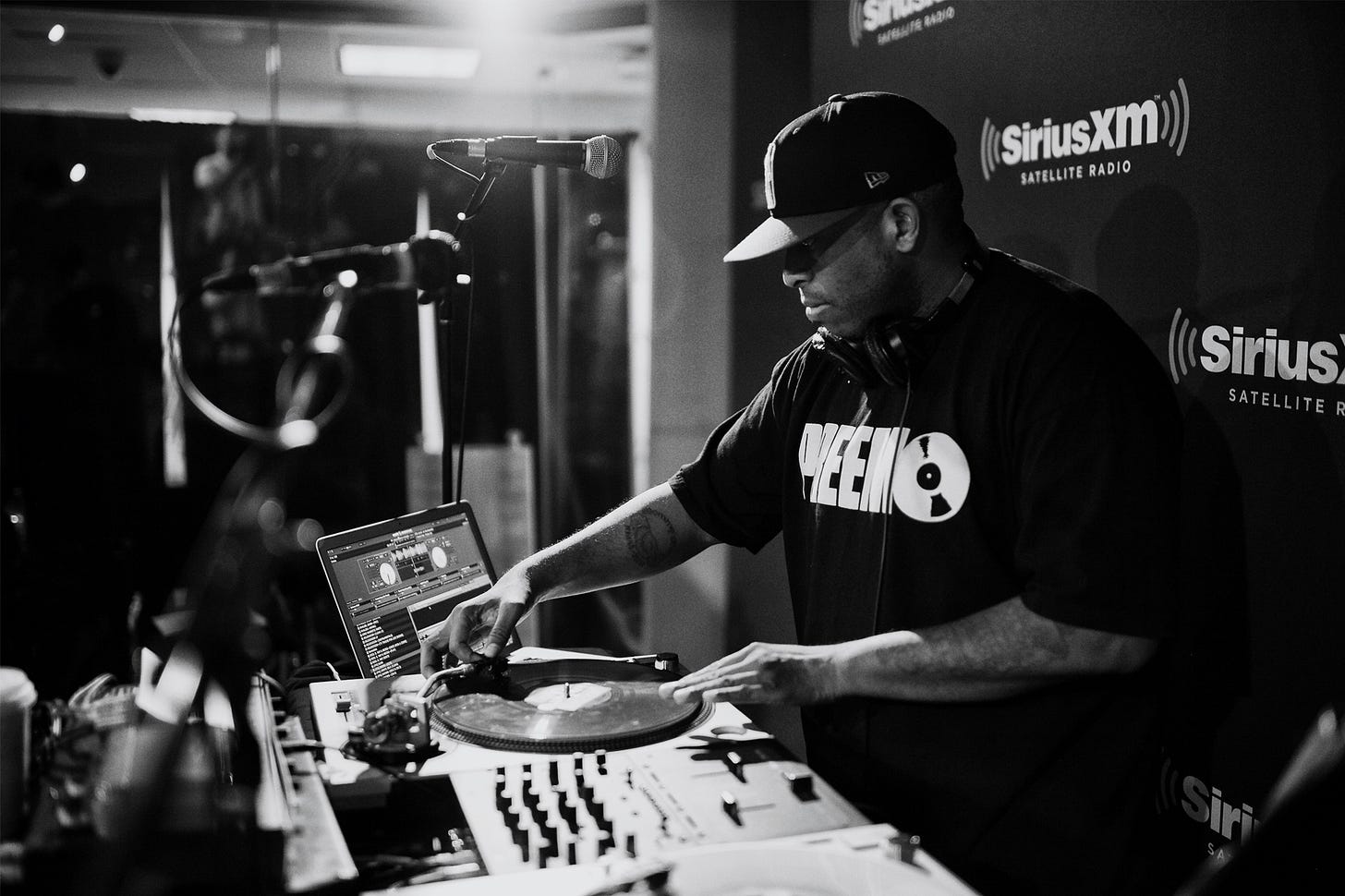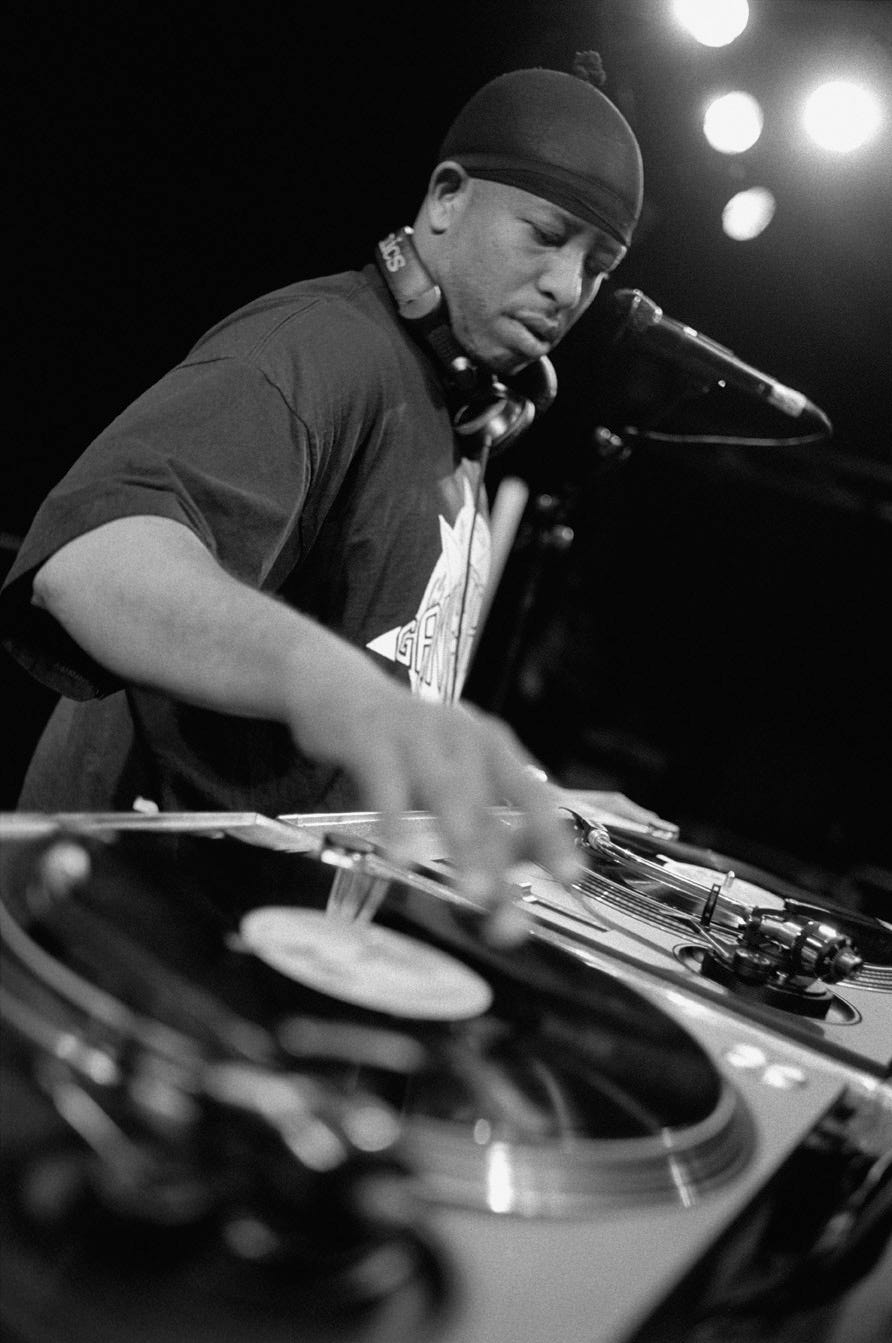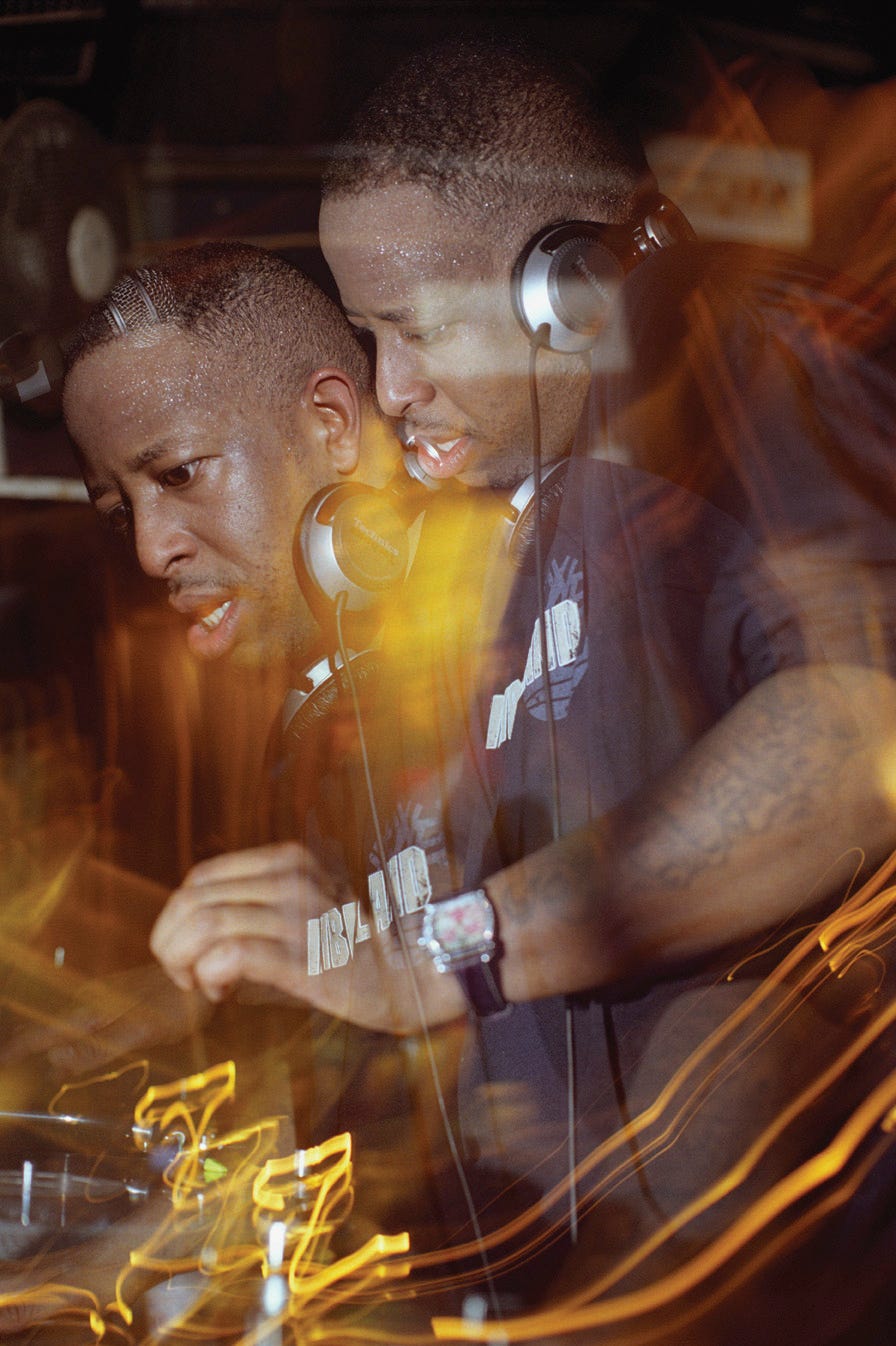Selected Works is a regular newsletter by the Te Whanganui-a-Tara, Aotearoa (Wellington, New Zealand) based freelance music journalist, broadcaster, copywriter, and sometimes DJ Martyn Pepperell. Yes, that’s me. Most weeks, Selected Works consists of a recap of what I’ve been doing lately and some of what I’ve been listening to and reading, paired with film photographs I’ve taken + some bonuses. All of that said, sometimes it takes completely different forms.
Thirteen years ago, I interviewed the American hip-hop legend DJ Premier for the now-defunct New Zealand music magazine Rip It Up. With today being his 57th birthday, I thought I’d republish that feature via my newsletter. Thank you for all the amazing music, DJ Premier.
New York City. The Big Apple, home to The Statue of Liberty, Times Square, Columbia University, The New York Yankees, and Christopher Edward Martin, bka DJ Premier. If you’re a hip-hop enthusiast or even a casual hip-hop listener, it’s almost impossible to think about New York City and not mentally make a touchstone with DJ Premier. After all, this is the guy who, between 1988 and 2004, as Gang Starr, alongside Guru (RIP), crafted some of the most timeless East Coast hip-hop tracks ever. Beyond this, we’re also talking about the guy who laid down the instrumentals for countless classic records by Nas, Biggie, Jay-Z, Jeru The Damaja, M.O.P, KRS-One, Rakim, D’Angelo, and so many others. ‘Full Clip,’ ‘When I B on the Mike,’ ‘Nas is Like,’ ‘NY State of Mind,’ ‘Ex Girl to Next Girl, the list goes on. All of this, regardless, Premier isn’t actually a born and bred New Yorker. Just don’t tell him that, though, because dude has unquestionably earned the right to be viewed as part of the essence of New York City – that NY State of Mind. Even better, he’s performing several shows in New Zealand this month. Can I get a hell yeah?
“I’m from Texas,” says Premier, speaking down a crackly phone line from NYC. “I lived in Texas until 1987. My grandfather lived in Brooklyn. He was from the south as well, but he was in a jazz band, and he was in World War II. His name was Grandfather Bill. He was my mum’s father, and we were very much alike. He was very into sport. He loved baseball. He used to take me to all the games when I was a kid. So, I’ve been coming to New York since whatever age I was in the fifth grade. I remember that was my first trip to go and see him in New York because he used to always come and visit us for Christmas. He was always the one who would give us the biggest cash gift for Christmas. When I was a kid, he would give us around one hundred dollars each, so we thought we were rich, you know?”
Fluent on bass, trumpet, trombone, and all kinds of other instruments, Premier’s Grandfather took a special shine to his grandson, possibly because he was his only grandson. Premier describes his Grandfather as his “biggest influence in New York.” Regularly making the trip up to NYC, first from 5th Ward, Lockwood (also home to The Geto Boys) in Houston, and then Prairie View forty minutes outside of Houston, Premier’s grandfather was a gateway to some special times. “He was always cool, and he always bragged about all the places he’d been,” Premier reflects. “He would show me pictures of all the places he’s been and all the women he’s been with. He had a whole album just of women. Even his wife, rest in peace, used to be like, oh Bill, why you gotta brag about all your women? He literally saved all of that stuff. I look at myself as the spitting image of him, but as far as, you know, just in a different generation.”
Premier’s first trip to visit his Grandfather in New York was critical because, by the end of the holiday, he knew he wanted to live in The Big Apple. As he put it, “If you are in fifth grade and you see a city as big as New York. You are already just blown away by the whole atmosphere of just the city, the life, the craziness.” “I remember the first train I ever rode on, on the subway. Somebody committed suicide by jumping in front of the train. We ran over him, and we had to reverse the train to get right off of the body! So, I couldn’t take my eye off the body, and the way the train felt when we had to back up and get off of the body, and the arm was already separated, it was still moving, the fingers were moving! As a kid, I was like, yo, that’s hot! I can’t wait to tell my friends what I seen! It was more of an exciting thing to me! So I went and told the story. No disrespect to the dead person, but I was like, yeah, this is definitely where I’m going to move to.”
At the same time, Premier was developing an early love of music and could be found DJing at parties his older sisters went to from third grade onwards. While his sisters probably weren’t that keen on a pesky little brother following them along, he had all the hot records, and his mother would make them take him along. Concurrently, when he’d head up to New York to see his Grandfather, he’d get the full street hip-hop experience, watching b-boys breakdance in Times Square, NYC style. “I was fascinated by cutting and scratching,” he says. “Eventually, I decided, yeah, I want to do that.”
Learning the proper DJ fundamentals from a guy at his school called RT Cola (like RC Cola) on a chunky Gemini mixer where, in his words, “you had to walk from one side of the mixer to the other as you crossfaded it,” once Premier was as he laughs, “nice with it,” he upgraded to his own gear, two turntables and a Numark mixer. “I would study Jazzy Jeff records and everything from Jam Master Jay to the Terminator X stuff on Public Enemy,” Premier reflects. “Anything that had cutting and scratching on it.”
Deciding he wanted to move to New York and pursue a hip-hop career, Premier found himself butting heads with his Grandfather. “He was actually telling me he didn’t think the rap thing was going to work,” he remembers. “I told him, he just doesn’t understand it. You know, we debated about it, but I’m the kind of person, who if I believe in myself, regardless of what you tell me; I’m totally going to do me anyway. So, at the end of the day, that’s what I did.”
Moving up with some college buddies, Premier, and his MC at the time, Topski, dossed down at a friend’s parent’s house and got jobs as youth councilors at a young people’s daycare centre. “We didn’t have the [work] experience, but we used to rap, and show the kids about hip-hop in order to know how real it was,” he says. “The kids just loved us, a lot of them I’m still in touch with to this day. They have grown to be a success, starting their own businesses and stuff. Some of them have clothing companies going well. Even the clothes that M.O.P wore in the ‘Ante-Up’ video, those were from one of my guys clothing lines, from when they were kids.” Things weren’t always easy for Premier though, especially when at the tail end of the eighties, his Grandfather passed away.
“I was going through a hard time when my Grandfather died,” he admits. My mums came up and saw how bad I looked. I’d lost my car and I’d run out of money. She was like, you should really come home. I was like, no. I’m not coming home until I get my deal. About two months from now, I’m going to be straight. I can feel it. I get these weird gut feelings. I still get them, and when I get them; everything happens exactly like I say it’s going to happen. I told her; in two months I’m going to have my deal. Two months later, I got my deal.”
The deal Premier is referencing was for a new group he was working with at the time called Gang Starr. This deal with Wild Pitch records, led to the release of Gang Starr’s 1989 debut album No More Mister Nice Guy and Premier’s transition from DJing and looping up samples on four-track recorders at home to proper studio recording. “I got into making beats more because Guru told me I wouldn’t get fifty percent of Gang Starr’s money if all I did was DJ,” Premier admits. “So, I was like, what else do I have to do. He was like; you have got to make the beats. I was like, right, and I really started perfecting my skills.”
Almost getting into a fist-fight with a studio owner over not being allowed to set his turntables up during a recording session, Premier’s transition into the proper studio world through No More Mr. Nice Guy was an interesting one. Looking at the experience as a learning one, he doesn’t consider the signature Premier sound to have been fully formed until the release of Gang Starr’s second album, 1991’s Step In The Arena. In his words, “With the first album, I knew what I wanted to sample, and I brought the records to sample. But in terms of the way it sounds once it was bounced, it doesn’t compare to what Step In The Arena brought into the fold. You know, from there. You can tell, from 1990 onwards, the production style started to really match up with what I do to this day.” From there on in, Premier and Guru formed a working relationship, which while ending in 2004, defined much of the template for sample driven, lyric heavy, laidback conversational hip-hop, East Coast style. Along the way, Premier worked on the side, crafting classic after classic for artist after artist –resulting in a discography which needs no introduction.
Circa 2010, in the wake of Guru’s untimely death from cancer, we find Premier working heavily on his own record label Year Round Records with artists such as NYGs and Nick Javas to uphold his musical standards; and determined to preserve Gang Starr’s legacy. “As an independent label there is so much responsibility,” he says. “I used to get high all the time; and I still do. But it really has to be when I’m on my downtime. I might take a puff in the morning. But as a boss, I have responsibilities that I can’t allow to bring down the machine. I am the machine. So, I gotta straighten up and get tight with my shit and really get it cracking in this business shit. I got to get back to where I used to be with my career. For now, I’m strictly focused on getting my work done. It feels better. It’s a big difference from where I was last year. A lot of work is getting done and my focus is on bringing out what is expected of me and my label; and that is exactly what you’re going to get this year, next year and all the years afterwards - just quality, quality, quality work.”
FIN.







